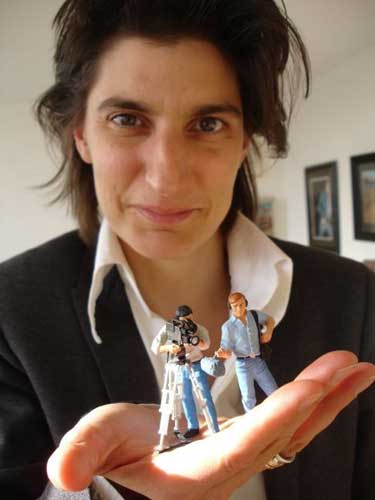MBA could be the brains behind the future of film and TV

An office in the back streets of London's East End seems an unlikely place to start a film revolution. But far from the glamorous film community in Soho, the Channel 4 BRITDOC Foundation, led by chief executive Jess Search, is aiming at just that.
Concerned that current models of funding and distributing documentaries in the UK are failing, BRITDOC aims to re-vitalise the industry. And to help, Search has turned to a business school to help provide the tools she needs.
Last year she signed up for Cass Business School's Executive MBA in film business. It's an unusual move in an industry where those who see themselves as creatives have a not-always-polite disregard for business strategy. But these are unusual times.
Search is not alone in thinking that TV in the UK is in crisis, with the only alternative provider of public service content to the BBC, Channel 4, strapped for cash as advertising revenues collapse. Documentaries – a public service – are what concern Search.
The foundation mission statement says it believes documentaries are a "vital part of British culture and democracy, with a unique role to play in reflecting on the way we live and challenging our ideas, assumptions and fears about the past, present and future".
"The old TV model in this country is imploding," says Search. "Documentaries that are fully funded by the broadcaster aren't going to survive and some clever thinking needs to be done about the business models for funding and distribution."
Search says doing the MBA helps the way she is perceived: "[It] means I can walk into meetings with brands, investors or large foundations and mentioning it immediately signals I'm thinking in a rigorous way about the future, not just looking for a hand-out."
The foundation gives production grants to film-makers who can't get their projects funded by a broadcaster, something Search says is part of the answer to the question BRITDOC was set up to consider: what the new model of funding and distribution should be.
Search fell into film-making after doing philosophy, politics and economics at Oxford, but has always harboured a love of business studies, having studied the subject at A-level. She even put five business schools out of a choice of six on her university application form. It was her parents who persuaded her to do the Oxford course, but now she's very happy to get back to her old passion. More business skills are needed in the industry, she believes.
"Head-down media producers don't have wider business awareness, so aren't going to be able to re-invent film structures," she says. "With the emergence of the creative economy and small business entrepreneurs like independent producers, you need to give people business skills so they can take their work to a higher level. That was the idea behind the film MBA and I thought it was very astute."
The Executive MBA is run by the Film Business Academy launched at Cass in 2005, the first dedicated film business centre in the UK, part of a Screen Academy network in partnership with Skillset, the sector skills council for the industry.
Students on the MBA can choose from electives dealing with strategic approaches to deal structures and negotiation, film investment strategy and consumer behaviour and marketing feature films. Courses are taught once a month in a four-day weekend block, Friday to Monday, to fit in with work schedules.
Each student must complete a business mastery project, for which Search is looking at the social impact of Al Gore's climate-change film An Inconvenient Truth, attempting to put a cash value on what the film achieved.
If, for example, one in 10 people who saw the film were persuaded to change to energy saving light bulbs, the amount of carbon saved could be calculated and given a cash value, she says.
Search hopes this very different way of assessing the success of a film will interest the different groups she wants to bring on board to help fund and spread the message of film campaigns. "In the future, public service content won't be the sole responsibility of bodies such as Channel 4, so we need partnerships with many groups," she says.
This kind of thinking will be ever more vital in a world that wants to see environmental impacts as well as financial ones on the bottom line. New partners, she says, will be looking new ways to assess their investment.
"Our model to help change the industry is one of brokering partnerships and working through leverage," says Search. "One excellent example is our new film The End of the Line, about global fish stocks. We first put money into the project but this enabled the producers to raise the rest from other foundations and global non-profit organisations.
"We've now brought a major supermarket on board to help promote the film and the issues in store and in the press – and a big fast food chain will be signing up to do the same very soon." While the details of this deal are still secret, it's clear the players will be big enough to court major publicity.
The "MBA toolbox" will, Search says, help her develop more ideas like this. Applying savvy business skills and thinking to non-profit problems is a growing trend, and there's no reason why documentaries should be left out.
Join our commenting forum
Join thought-provoking conversations, follow other Independent readers and see their replies
Comments
Bookmark popover
Removed from bookmarks